Thursday, 27 June
-<link>
fat intake
 My grandfather figured out that he needed to eat just about constantly in order to maintain his mood and productivity. So when grandma was alive, she would carry a ziplock bag in her purse, inside was a ham and cheese on wheat with lettuce and tomato sandwich, cut into quarters. About every half and hour, she'd feed him a quarter sandwich as he was driving somewhere in north central Nebraska. If we were out in the boat on the pond, or maybe running an errand to the hardware store, he'd fish his own crushed quarter sandwiches out of the pocket of his jumpsuit.
My grandfather figured out that he needed to eat just about constantly in order to maintain his mood and productivity. So when grandma was alive, she would carry a ziplock bag in her purse, inside was a ham and cheese on wheat with lettuce and tomato sandwich, cut into quarters. About every half and hour, she'd feed him a quarter sandwich as he was driving somewhere in north central Nebraska. If we were out in the boat on the pond, or maybe running an errand to the hardware store, he'd fish his own crushed quarter sandwiches out of the pocket of his jumpsuit.
|
Working in Oakland's Embarcadero Cove, renting office space for the summer from Chris Hecker.
Embarcadero Cove is a cluster of old Victorian-era buildings relocated from construction sites to a quiet cluster near a small boat harbor. A loose collection of independent game programmers work out of the second floor of a barn-like building. Here's some photos inside today:
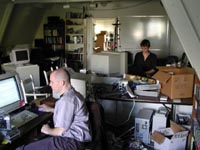
bald Jon Blow in foreground
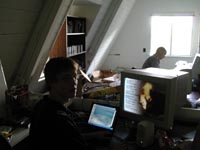
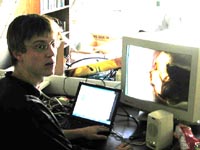
Thanks to Charles for the pix
|
Now I'm on my own trying to regulate my mood and productivity, I've settled for some Western indulgence. Back from Japan I've kept a steady pile of stinky cheese within arm's reach at my office. Every twenty minutes I smear up another Carr's Whole Wheat Cracker and shove the fatty salty load down my gullet. Yum. Accordingly, my chin is now encrusted with two saturated-fat pimples and a third is pushing its way to the surface.
I related my grandparents' quarter sandwich story to Jane, she became excited to help me in a similar fashion. Tonight, if we can find time between Final Fantasy Tactics and Super Sheet Chasers, she will show me how to make mayonnaise.
And then I plan to limit my fat intake for the rest of this season.
re-learning web publishing
I learned how to make web pages in December 1993 and January 1994. I learned a little more between then and early 1996, mostly about using "tables" to place pictures and text on pages. But I stopped learning new web publishing techniques in about mid-1996, when the web developed "cascading style sheets" for more sophisticated control of looks and layouts. Similarly, when people started using databases and weblogging software to update their sites, I stayed put with my hand-tooled html. I like having direct control over my pages, and I think these pages show it. They look increasingly like dot matrix printouts next to the laser printed pages of many of my actively web writing peers.
 Primitive ugliness may beget its own pride, but there's something useful emerging out of the tools that web publishers are making for other web publishers. In 1996 or so I would work to hoist people online as personal publishers - gripping their wrist, arm nearly out of their socket as they reached to understand HTML tags and pages on servers. I would refuse to accept that they might not understand or process simple technicalities - "this is too easy!" I cried! But often the people I taught wanted to do more advanced things than my 1995 web skillz could easily afford, and they expected these things to be easy to do. The simplicity of my means limited my scope. At least one would think.
Primitive ugliness may beget its own pride, but there's something useful emerging out of the tools that web publishers are making for other web publishers. In 1996 or so I would work to hoist people online as personal publishers - gripping their wrist, arm nearly out of their socket as they reached to understand HTML tags and pages on servers. I would refuse to accept that they might not understand or process simple technicalities - "this is too easy!" I cried! But often the people I taught wanted to do more advanced things than my 1995 web skillz could easily afford, and they expected these things to be easy to do. The simplicity of my means limited my scope. At least one would think.
No! I cobbled together thousands of pages by hand. Maintaining their structure in my head. Jane said to me the other day, your site frustrates me because there's no navigation. No overview of the contents of the site on the front page.
So I compiled a listing of links.net directories.
competent passion
I met with Joi Ito just before I left Tokyo ten days ago.
 In an unadorned Neoteny meeting room with cubish comfortable leather furniture, he asked, What are you doing [back in the states]? Eager, I replied, I'm leaving Japan for the summer to be with this girl I love. Pausing I considered for a moment, I'm not sure if that's the best strategic decision for my career as a correspondent, but I feel I have to follow my passion. He smiled, "that seems to be your core competency."
In an unadorned Neoteny meeting room with cubish comfortable leather furniture, he asked, What are you doing [back in the states]? Eager, I replied, I'm leaving Japan for the summer to be with this girl I love. Pausing I considered for a moment, I'm not sure if that's the best strategic decision for my career as a correspondent, but I feel I have to follow my passion. He smiled, "that seems to be your core competency."
Joi is a busy mind with nearly nine years of experience personal publishing on the web. He needed a new web home for some thoughts. So I used him as an excuse to experiment with what seems to be the most sophisticated of the current batch of web publishing tools, Moveable Type. Multiple people can log in through a web browser and edit a web site. I worked with bcm to build something like that for Bud.com, a web site I have run with friends on-and-off for about four years to collect the weird wild and wonderful of the world wide web (which I did avidly myself until mid-1995 when the search for meaning offline largely overtook the search for everything damn thing online).
So now I'm using Moveable Type about six hours a day; I have a web log set up for Joi, one in English and testing one in Japanese. I've got Bud.com set up with distributed power to publishing, and a private weblog for myself and Jane. This tool, and others like it, makes updating web sites easy and definitely more collaborative. I'm just beginning to taste the potential, but there is no question that this is the future of the web.
This holy mess of links here continues as a sort of living museum of early web era primitive HTML tooling. I grow closer to merging with the great database.
<justin> i'm thinking this shit is good enough for me to try to port links.net
<jim> nice!
<justin> but that's a little bit frightening a thought
<agro> do it
<justin> why agro?
<agro> because maybe you will update more often
<justin> hah
<justin> true there
<justin> what about quality over quantity?
<agro> well you should work on that quality part ;)
<justin> that's my goal
<agro> I think you write more in a inverse relation to the amount of sex you are having
thanks to Jon Blow for his xanatoo,5:28pm,[/www/Links]> find . -type d help today.
Tuesday, 25 June
-<link>
I was in a prison camp in China. Busted for being mouthy. Then I was caught again outside the camp. You mean I can just walk out? Not in a surveillance society. "What are you doing out here?" the young man with dark spiky short hair asked after he bumped into me, I felt his soft cotton grey garments brush my arm. "Looking for my lawyer."
Escorted back, I was sleeping in filth and eating questionable breaded pork prison rations, detained against my will for crimes I didn't understand with no trial date or official recourse. But Perry Farrell was my bunkmate, and I was free to wander a sprawling complex of flat gray concrete prison buildings. They even let me keep my mobile phone, which somehow could call America. There were many interesting international detainees, including Markisha Nance the articulate young black woman from my high school class who ran against me for graduation speaker. It was a provocative place; my sweaty upset confusion passed quickly when I saw Jane asleep next to me.
Friday, 21 June
-<link>
<wb> the return of bud.com
<justin> can you feel the seismic shift online?
<cin> whas i on vacation?
<cin> was it
<wb> i can feel it
Thursday, 20 June
-<link>
TheFeature.com: 3G: Will Children Father The Industry?
What are high speed video-camera mobile phones good for anyways? Maybe Japanese teenagers will tell us, if we give them a chance.
Wednesday, 19 June
-<link>
Jane got me up, jetlag got me down. Gotta get this writing, gotta get this paper. Falling to sleep. What can be done? Turn on Iggy and the Stooges search and destroy, i got a right, i wanna be your dog. Could anyone sleep through that much musical excitement?
Renting an office until September from Definition 6, in Embarcadero Cove, Oakland with a bunch of unemployed independent game programmers. Fast pipe, good conversation, nearby cheap Vietnamese beef stew.
Tuesday, 18 June
-<link>
Jane takes up the question: "But how is Tolkien much different from Thucydides?"
Here are thoughts on history lacking neither romance nor use value. She's been pouring over tomes with an old basement smell as well as Internet newsgroups, reading both fiction and non-fiction, wondering about common threads of human compulsion. What compels the writer? And what compels the readers, who absorb, footnote and question these histories? It doesn't seem to be reality, or a lack thereof; in this case it seems to be attention to detail:
"I don't mean to suggest anything so spurious as all history is fiction, because otherwise I'd have to say all historians are novelists, and I think a good historian is much more than that - a good historian is a combination of research scientist, novelist, and archivist."
I studied Irish novelist James Joyce slightly in college, with some interest to see how he created Ulysses that has resonated as genius with so many folks. Professor Philip Weinstein explained that he had chosen a particular day in Ireland's (then) recent past, and set his book very much at that time. Reading over old newspapers, keeping track of which horse had won, placed and shown in the races that day. Writing down places and events on small scraps of paper which he filed according to an elaborate and personal taxonomy. Serious detail delving.
And similarly with Faulkner, he wrote his novels in a fictional part of the American south, and spent his life iterating that particular place. And Proust - Proust is known for one central text, his deeply long Remembrance of Things Past, which is quite literally "history." All novelists (and Richard Garriot and perhaps even Hieronymous Bosch) create fictional worlds, some work more arduously over longer careers to flesh out those places, and some write to make you aware of their creation - the same sort of couching that Jane quoted from Thucydides, buried in style and textual asides.
Jane gives some preference to historians with her phrasing above, but then a good novelist would seem to have similar work to do. Of course there are different sorts of novels; some seem to be written faster, with less grounding and concocted mythology behind them. But many novelists I've read about or talked to spend a good amount of their time reading and filing away information from other sources besides their subconscious.
I began writing a novel in January, and it has been fun to imagine that I could take each of the characters in that book and write about them in an individual story, with an eye towards developing the text, as the text is a much larger thing that exists historically, as I can visit the library of my mind to research it and remember it. And for my characters, to afflict them with genuine maladies and give them resonant careers, I've researched subjects in non-fiction books and web sites. Studying and then contextualizing.
That might approach the methodology of history, at least from an amateur angle. I still need to develop a better understanding of the meaning of history, if there is such a thing. I'm flying from Tokyo to Berkeley today to better address this question. And I'll be reading Jien on the plane.
Sunday, 16 June
-<link>
gaming frame of reference
In magazine and newspaper articles, movies and books are cited regularly, expecting that people share them as a common frame of reference. Comic book heroes might even be mentioned, as today people are expected to be familiar with particular men and women in tight colorful suits.
But video games are still largely left out. It's still the case that few folks writing for magazines and newspapers were young enough to have wasted their youth on electronic entertainment. And those young enough to know Mario from Wario likely have their media jobs in part because they tailor their remarks to suit a crowd of people who don't enjoy managing electronic symbols on the screen for the sake of stimulation.
 Today I played several hours of Fallout: Tactics (a demo version of a two year old game I downloaded for free). I set it on the hardest level, and crawled around on my belly seeking out desert raiders with jury-rigged guns.
Today I played several hours of Fallout: Tactics (a demo version of a two year old game I downloaded for free). I set it on the hardest level, and crawled around on my belly seeking out desert raiders with jury-rigged guns.
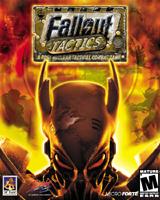 The language and setting of the Fallout series deliberately echoes an early and most articulate computer role-playing game, 1988's Wasteland, where post-apocalyptic Las Vegas plays barren host to drugged-up irradiated cyborgs hungry for old data or fresh flesh.
The language and setting of the Fallout series deliberately echoes an early and most articulate computer role-playing game, 1988's Wasteland, where post-apocalyptic Las Vegas plays barren host to drugged-up irradiated cyborgs hungry for old data or fresh flesh.
(I was quite smitten lately when Jane made a casual Fallout reference).
It's really only a matter of time before games become as ready references as movies and books. Lara Croft, "Super" Mario, these characters have already taken to much larger screens screen. I will be excited to see when video games no longer occupy a sort of small ghetto, the occasional review in a back-corner of a well-written magazine or newspaper, but rather specific moments, characters and ideas from non-blockbuster games are dropped casually in writing, as though the author expects you to understand what they're talking about. "Cleaning my closet today was like Tetris" or "it was a frag-fest in the senate chamber today" is something you might expect to read on a weblog. And weblogs are the future of media. So I'm comforted by this.
I'm investing in the future, when video games are common references. To complement a background in computer gaming, I've begun a more extensive study of console games, starting with the utterly bitchin' Nintendo 64 first-person shooter Goldeneye I played in college and continuing now with a ladyfriend rather fond of Final Fantasy Tactics. I've begun conversation with people who make games, exploring their thinking and their cultural references. I've already learned an enormous amount from lectures by friends at Ion Storm Austin. To put Ion Storm Austin in context, I will draw a parallel between them and a famous group of collaborating artists from the last century - how about Looking Glass Studios?
Some critics who come from the more established schools of paper and celluloid recognize the pending cultural broadening. New York Times book cum film critic A.O. Scott talks about how Star Wars is to be celebrated for "the way it opened mainstream cinema to a vital strain in American popular culture that Hollywood had until then largely ignored or treated with condescension." (He's referring to comic books and pulp sci-fi). There is some excitement about games now, to be sure, and there's too much money involved and too many kids with Pokemon dispensers for video games to be ignored entirely. Still as a cultural force, it lurks primarily at the edges - "kid's stuff". Here is A.O. Scoot reflecting:
(Even today, the primary locus for fantasy scenarios in which lone heroes do battle with demons and bad guys in archaic or futuristic landscapes is not movies but video and computer games, which are open-ended and participatory in ways that even a boxed-set DVD version of a movie can never be.)
Those quotes are from an article that is worth lauding separately:
the rise of nerd media? study up.
"In the United States today there are hundred of thousands, perhaps millions of people whose grasp of the history, politics and mythological traditions of entirely imaginary places could surely qualify them for an advanced degree."
A.O. Scott is not only funny, he's accurate. His articles, nominally about film, do a unusually good job surveying broad swaths of popular culture. He doesn't dismiss anything easily; he elevates articulate expression while looking askance primarily on falsehood.
His particular art is perhaps best seen in his recent New York Times article "A Hunger for Fantasy, an Empire to Feed It." The four largest recent movies, grossing over a billion dollars, were each easily placed in the category "fantasy." In essence, comic book, science fiction, and fantasy nerds have won over popular culture. But rather than a silly dismissal, Scott examines the way these fantasy genre films involve massive amounts of study: "Any Muggle can thrill to a sword fight or a computer-generated aerial battle, but true wizardry lies in the mastery of arcane detail."
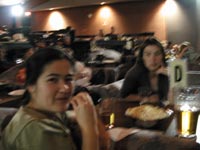 Originally, I sent this article to Jane. She's the only person I know who can tell Tolkien's Elvish from anything else. Watching Lord of the Rings with her was a wild experience - she was a talking linkfest. Deep in a couch at the Parkway, she explained as she knew of each of the characters, their families, their personal allegiances and Tolkien's original source mythology behind each moment she favored. The LoTR movie was rich, I enjoyed it as a lay-person; she seemed to have an even better time as an informed participant. A historian's mind turned loose on manufactured culture. But how is Tolkien much different from Thucydides?
Originally, I sent this article to Jane. She's the only person I know who can tell Tolkien's Elvish from anything else. Watching Lord of the Rings with her was a wild experience - she was a talking linkfest. Deep in a couch at the Parkway, she explained as she knew of each of the characters, their families, their personal allegiances and Tolkien's original source mythology behind each moment she favored. The LoTR movie was rich, I enjoyed it as a lay-person; she seemed to have an even better time as an informed participant. A historian's mind turned loose on manufactured culture. But how is Tolkien much different from Thucydides?
(blurry picture from the Parkway, Jane on right)
and
Email from Kathleen: "Wireless is the new black."
Saturday, 15 June
-<link>

As ever, Patrick Farley is a mind-blower - mixing rich color science sex spirit and wit that saves him from taking us too deep. Another e-sheep online, and this one is 4 megabytes and 40,000 pixels wide. "Adult content" but what else would you expect? http://www.e-sheep.com/delta/heartofthesun.
His infrequent e-sheep updates are perhaps the web content I enjoy most intensely.
maybe as a journalist
Maybe as a journalist is it easier to write about business and technology because the act of journalism is distance - to critically observe and report on what seems obvious to small communities for larger more lay communities. And I have this problem when I try to write articles about things I care about, I get too close to the subjects - I can't figure out how to make them appealing for more mainstream magazines.
Yes, Justin, that is very interesting culture. Why should we care?
What, interesting culture is not enough? Here, let me explain it better.
No, that's fine, you've written enough. We need a particular event, or person, something controversial or particularly provocative. An edge, a hook.
But people are people. I can usually think of something to make my article about a person or cultural thing provocative; it involves revealing the one thing they would be most embarassed about. I'm not sure it's appropriate to dig out their drama for my living. Perhaps I've been chastened by my web page, and culture-makers have themselves repeatedly unmasked in public without minding so much.
But isn't their art provocative enough? I get hung up thinking that the basic essential thing should be enough. It's academic more than popular. And then I fall back into writing about technology and business because there's money in that regardless of whether or not it's salacious or embarassing. I can coax up an interest in business strategy and I don't have to feel like I want to be with or even like the people I interview. It almost comes easier to me because I'm detached. It's like high school - the girls I had a crush on were way out of reach; Jessie didn't seem to give a shit and he got girls all the time. At least in my personal life I've sorted out that dynamic. Though I'm still recently bewildered that someone so attractive to me seems to like me very much as well.
And then I sit across the table from a man who develops and distributes gay / minority / scifi / sex / documentaries in Japan and I think he is one of the most dynamic provocative people I've met here and if I can't make an article out of him I must really suck as a journalist. Afterwards I tip back a tiny glass of beer at a conveyor belt sushi restaurant in Shibuya; as the soccer screaming hoards outside continue revelling, I turn to my translator friend: I'm not a journalist, I'm an artist. I don't want to critique these people making culture, I want to join them. But that's why you're a good journalist, she offers kindly, you get close to them. Reaching for more asahi in a can I reply, you can't write regular journalism close to them. You write gossip or songs.
Friday, 14 June
-<link>
Peter isn't the only one recently traveling with a parent:
Mom is going to make her own photo album, maybe she'll have her own web page some day!
The editor of FuckedGaijin - a support, cultural exchange and pride site for foreigners living in Japan, s/he emailed me asking how I got my Journalist's Visa. After I posted that story, I went back to that site and saw a far more woeful tale.

Caroline finds herself oddly caught up in Football team spirit enough to have painted her nails for British Team colors.
|
After four wonderful $25 days at Taito Ryokan, I'm being kicked out into the night again by people who plan their travel ahead of time. Wonderful days, woken up by soccer fans from three different countries gathering in the lounge on the other side of a thin wall from my bedroom, watching morning football reruns and talking in English the common tongue that provides me just enough stimulation to propel me out of six hours of sleep.
Met yesterday with Caroline Pover; looking over my Tokyo Guide to arrange Japanese distribution, she suggested including more personal narrative for a second edition. She's got a certain sort of light behind her steely blue gaze - she came her an English teacher, started a magazine for foreign women, turned that into a bestselling book Being a Broad in Japan which she self-published. Now she's publishing other books, and developing a career counseling company for Japanese and foreign woman. She's someone to keep an eye on here.
After less than a week more wandering in Tokyo I expect to return stateside; I'm distracted burning all the wires back to California. Once there I expect to start work developing my international consultancy.
Wednesday, 12 June
-<link>
Now that people associate me with Japan, I am asked about things:
- Justin, can you help me find live venues in Tokyo/Osaka/Kyoto for my band/rap group/one-person show to perform in?
- Justin, can you translate this web site? Can you rewrite this
Japanese marketing copy in English?
- Justin, can you introduce me to a Japanese programmer / a parasite single / Donald Richie?
If I wasn't more curious to study the rules and passions governing human conduct, I might set up a web production and translation consultancy / entertainment booking and promotions agency / office with a big oak desk and a green shaded lamp with lots of books and scrolls where I can sit like Julius Deane pulling hidden strings.
There's a temptation to take on just this one gig, arranging my contacts and expanding my tech expertise for this mercenary job, because the money seems easier than this pavement pounding and idea selling. But it's a lie I know it. And when I meet these people here at the Foreign Correspondents' Club who are business people but were writers, I wonder what happened to their curiousity?
Any job requires some new learning; I'm focused about what I study and what skills I learn. Focused on the useless and intangible it would seem. Obviously I need to evolve my sense of appropriate business or my capacity as a human being because there's a wide range of work experience available and money to be made. Kurt Vonnegut used to write ad copy for Saab. Lord knows what William Burroughs used to do for money. But Mark Twain lost his shirt on his investments:
"Throughout the 1880s, Mark Twain, according to Hill, became involved in a number of occupations and investments (82). He began publishing his own books, invested in an engraving process and a typesetter, and began copyrighting and manufacturing children’s games (83). His investments and extra literary occupations turned a significant amount of his attention from literature and eventually lead to his bankruptcy in 1893 (82)." - PAL: Mark Twain (1835-1910)
It's all a learning experience; money lost and bankrupt, Twain took up a European speaking tour that prompted him to write another book.
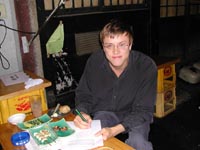
Under the tracks in Yurakucho,
composing the next Links.net newsletter.
Tuesday, 11 June
-<link>
crane on the brain
There are too few poems I have memorized. At first forced by school, and then for love of words, strong ideas and offputting correlations. Most of the poems I have memorized are other people's favorite poems. They show them to me and then I take them into my mind and on through my tongue as my own.
Perhaps since I am in Japan I should memorize something by Ikkyu, my favourite Japanese poet. His idea "Yesterday's clarity is today's stupidity" rings true these days. To have the true sound and meter of his language would mean memorizing thousand-year-old Chinese, unrecognizable by most folks alive today. Those poems I know thus far come back in my own writing, phrases that echo wisdom older and better written. I have recently purchased a calligraphy brush from a small shop in a mountain town in west Japan; perhaps I will yet come to employ thousand-year-old Chinese in my writing and speaking.
Recently, I re-ran across a poet Hart Crane. This man I first heard of at my Uncle's house in Nebraska; a friend of my brother's was visiting one summer. With her, a poet, writer and college student with unruly stalks of blond hair, an upbringing in pentacostal Michigan, and nothing to do in Lincoln, Nebraska for two days but unpack his poetry books and share his favourites with a young teenager. I learned about Hart Crane then; I may have learned about other writers, but I don't remember them now.
So rereading Brooklyn Bridge today, it strikes me strong - sweeping language in urban America. The mundane given wings and still mostly earthbound. I have printed it out and I shall carry it and repeat it, develop an understanding of it, and make it a part of my mind.
coverage
Coverage of the recent Electronic Entertainment Expo from this May:
TheFeature.com: E3 2002: Enter the Hardcore Mobile Gamer?
Hardcore mobile phone gamers might make for the same sort of hardware arms race in phone technology we have with personal computers; once we can chat and exist in 3d worlds on portable communications devices, we might have the hardcore gamers to thank.
Monday, 10 June
-<link>
Recent piece from J@panInc Magazine reprinted online:
It takes time, money and a steely determination to access your unsolicited commercial emails on the road.
TOKYO IS A PAIR OF wrap-around interactive TV goggles with quadraphonic speakers that can seldom be turned off. Add plentiful Internet connections to convenient contemporary culture and you've got delicious over-stimulation.
That over-stimulation first lured me to live in Japan. But after a few months of involuntarily listening to loudspeakers, surrounded by beautiful people always in a hurry, I felt drawn to tranquility and old Japanese culture in the countryside. Leaving Tokyo would be calming, but leaving the Internet would be panic-inducing. Before I went to the country I figured I would buy some wireless modem connection to connect my laptop from the hinterlands. But since I was unsure that any Tokyo gadgetry would work where the rice grows, a friend observed that I should probably buy the technology where I expected to use it.
J@panInc: Internet Withdrawal in Akita
(based on my time in Akita prefecture)
From Peter Rukavina, a review of Just In Tokyo: "a new sort of guidebook."
Friday, 7 June
-<link>
Sales of the Tokyo guide book have been steady, one or two a day maybe.
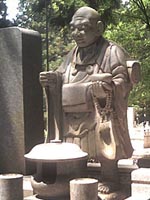 It's good to have something tangible completed and out in the world. I spied one of the South Park gents, Trey Parker who played the Mormon protagonist in the comical Orgazmo film, coming out of Hiiragiya ryokan in Kyoto. He said he had not yet been to Tokyo this trip, so I thanked him for his excellent musical and gave him a copy of Just In Tokyo.
It's good to have something tangible completed and out in the world. I spied one of the South Park gents, Trey Parker who played the Mormon protagonist in the comical Orgazmo film, coming out of Hiiragiya ryokan in Kyoto. He said he had not yet been to Tokyo this trip, so I thanked him for his excellent musical and gave him a copy of Just In Tokyo.
Just spent two days with my mother staying at a mountain-top Buddhist monastery town. 3000 citizens, 200,000 dead. Deserted by night, except for the sounds of the cars that had been chopped up down the street, extra seats removed, inside panelling stripped, stereos ripped out, cars reduced to minimal weight for racing. At night you could hear their great engines revved, careening around the narrow mountain top, where many holy men are buried and their followers prostrate chanting daily: Koya-San
Monday, 3 June
-<link>
Starting in April I began here to share some feelings I now rediscover alone in time apart from a bright young woman with whom I am thoroughly smit. All that was writing on this web site of love and feeling and wondering and planning is more directly channeled, as
 Jane and I share an unending torrent of topics and love language writ in email, private web pages, mobile phone mail, phone calls, hand written letters, and when we can manage, time horizontal and vertical talking talking talking and smiling smiling smiling.
Jane and I share an unending torrent of topics and love language writ in email, private web pages, mobile phone mail, phone calls, hand written letters, and when we can manage, time horizontal and vertical talking talking talking and smiling smiling smiling.
It is glowing and it is not always easy this relating but it is astonishing how much and how easily I feel I can speak of my feelings for this girl. I'm traveling Japan with my Mother who can't yet be tired of hearing about my love, my study partner, my correspondent, my historian. I've taken to telling random foreign strangers in bars and Japanese receptionists. And always her, as telling her is telling myself and telling the world that I see and feel love and this is to sing and to feel my heart open - blood comes up my throat and out my mouth to cover all around me a rich deep red.
my teacher
a woman is enlightenment when you're with her and the red thread
of both your passions flare inside you and you see
- Ikkyu, drawn from Crow with No Mouth
visiting my teacher in Kyoto
Football Building in Japan
With blasts of compressed air, the 2.5-acre soccer field levitates four inches. Then, like a giant green tray, the expanse of grass slowly rolls into a silvery, flying-saucer-shaped stadium. Inside, computer commands have folded away baseball bleachers like steel origami, part of a recent practice run for the first World Cup soccer game here, on June 1.
Terrifically amusing article by James Brooke about Japan's stadium building for the world cup: "Legacy of World Cup May Be Stadiums" from the New York Times. Unlike most previous, western nations, that merely refurbished or adapted old stadiums, Japan, and to a lesser extent, Korea, have spent enormous sums building and cyber-ifying state-of-the-art modern gladatorial arenas. Japan has spent 4.6 billion dollars on architecture for the world cup:
"What Japan has built for the World Cup is absolutely fiscal insanity," said Marty Kuehnert, an American sports consultant and broadcaster based in Tokyo. "We will see most of these new stadiums go belly up."
Nikkei Business, a killjoy publication that looks at ventures in Japan like an old-fashioned accountant, sourly commented that the new stadiums "might just as well be ruins in the Egyptian desert."
Hah I can not help but celebrate these Japanese and South Korean builders; as all of life is fleeting, why should they not build some amusing ruins?
Kobe's Wing Stadium has a computer-controlled water pipe system to regulate water, oxygen and fertilizer. Miyagi's stadium, designed to resemble a 16th-century Japanese samurai helmet, provides an in-house group-hearing-aid system for designated seats. Oita's stadium, known as the Big Eye, has a Teflon membrane translucent roof that retracts in 20 minutes.
Of course while I celebrate this expert frivolity, it is in fact a sign of some deeply entrenched troubles in Japan, where much of the economy is sorely invested in the construction industry. Perhaps this stadium building will end up providing the "infrastructure for soccer" in Japan, boosting attendance from 3,000 a game to stadium capacity 40-70,000 per game. If it doesn't, it may end up being a most astonishing example of dig-one-hole-to-fill-another:
Robert Whiting, an American who has written several acerbic books about baseball in Japan, said of the stadium-building frenzy: "In order to keep the construction state going, the L.D.P. is going to have to issue new contracts - to tear the stadiums down."
Ken Belson's recent New York Times piece "English 101: How to Handle a Thirsty, Big-Bodied Soccer Fan" features a Makiko Inoue translation of a brochure published by the British Embassy in Tokyo to advise Japanese businesses on conduct appropriate for visiting soccer fans. Quite amusing and telling. Cultural differences are softer now than they have been, but the past echos through these warnings:
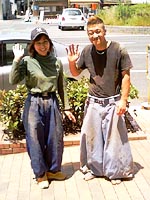
after a ramen lunch break from construction in West Kyoto, Mayumi and Futoshi stand for a photo. Notice their wide-flared worker pants. Futoshi is wearing distinctly toed tabi-style shoes with thick soles.
|
Some supporters are very noisy. You might feel frightened by their big bodies and their large numbers. But please don't view them only as a threat. Be generous and try to understand and share their enthusiasm for soccer.
Of course more than being scared, the Embassy wants to encourage the Japanese to relate directly and honestly with their kind, gentle fans:
It will make quite a difference if you memorize a few English phrases such as "Welcome," "Can I help you?" and "England are a great team."
Mom and I have been staying in a nice suite at Tawaraya Ryokan. This morning the kimonoed attendant and I were talking, she explained that I had slept on the same futon as the King of Sweden - the extra long.
Saturday, 1 June
<link>
I left my heart and my digital camera near San Francisco. Fortunately, my study partner sent my camera to me here in Japan. Unfortunately, that camera must go through customs, so it won't arrive for another day or three yet.
Meanwhile, my mother and I have trekked ever deeper into traditional lands. In estimation of this, I stopped by a popular Tokyo electronics store chain that plays its own jingle on a fourty second loop repeatedly, inside and outside of the store:
"Bi-ku-bi-ku-bi-ku-bi-ku-ka-me-ra!"
and investigated the cheapest digital cameras they had. They had many digital cameras for under $100. For $80, I got the [link embargoed while I write this up for money]
Both Alex Kerr and Donald Richie will be speaking at the Foreign Correspondents' Club of Japan book break this month in Tokyo. My recently published Japan guide book Just In Tokyo features unauthorized quotes from each of them, so I hope to attend and provoke them in person.
War without Jane Austen
Links.net Trivia:
(at least) Two writers born on the same day (December 16) as Justin Hall:
Philip K. Dick and Jane Austen.
See a common thread?
|
Reading Jane Austen, Pride and Prejudice, was great fun. It was an emotional thriller, long overdue for reading, as many of my friends, particularly women, had recommended her glowingly for years. Adjusting to be able to read the language took a slight bit of doing. Then I found myself speaking just slightly more elaborately and completely about my feelings as they were stated often in the company of the person who had prompted me to take up that fine volume. A lady, she is herself accomplished, as accomplished is defined in that text and appreciated by this reader; proficient in more than one tongue, passionate about praciticing the arts, raised with culture while keeping a sharp mind and a most generous disposition.
Now having finished that book she rather herself enjoyed some years back, I have taken up another author recommended by this woman, my companion and teacher - John Dower. She commended me to him, as his considerations of race and pride around World War II in Asia should provide a good background for this boy who has only ever studied the war in general "history of the world" terms. War without Mercy has started off quite strong.
May - Permalink!
Thanks, Cyborganic
 My grandfather figured out that he needed to eat just about constantly in order to maintain his mood and productivity. So when grandma was alive, she would carry a ziplock bag in her purse, inside was a ham and cheese on wheat with lettuce and tomato sandwich, cut into quarters. About every half and hour, she'd feed him a quarter sandwich as he was driving somewhere in north central Nebraska. If we were out in the boat on the pond, or maybe running an errand to the hardware store, he'd fish his own crushed quarter sandwiches out of the pocket of his jumpsuit.
My grandfather figured out that he needed to eat just about constantly in order to maintain his mood and productivity. So when grandma was alive, she would carry a ziplock bag in her purse, inside was a ham and cheese on wheat with lettuce and tomato sandwich, cut into quarters. About every half and hour, she'd feed him a quarter sandwich as he was driving somewhere in north central Nebraska. If we were out in the boat on the pond, or maybe running an errand to the hardware store, he'd fish his own crushed quarter sandwiches out of the pocket of his jumpsuit. Primitive ugliness may beget its own pride, but there's something useful emerging out of the tools that web publishers are making for other web publishers. In 1996 or so I would work to hoist people online as personal publishers - gripping their wrist, arm nearly out of their socket as they reached to understand HTML tags and pages on servers. I would refuse to accept that they might not understand or process simple technicalities - "this is too easy!" I cried! But often the people I taught wanted to do more advanced things than my 1995 web skillz could easily afford, and they expected these things to be easy to do. The simplicity of my means limited my scope. At least one would think.
Primitive ugliness may beget its own pride, but there's something useful emerging out of the tools that web publishers are making for other web publishers. In 1996 or so I would work to hoist people online as personal publishers - gripping their wrist, arm nearly out of their socket as they reached to understand HTML tags and pages on servers. I would refuse to accept that they might not understand or process simple technicalities - "this is too easy!" I cried! But often the people I taught wanted to do more advanced things than my 1995 web skillz could easily afford, and they expected these things to be easy to do. The simplicity of my means limited my scope. At least one would think. In an unadorned Neoteny meeting room with cubish comfortable leather furniture, he asked, What are you doing [back in the states]? Eager, I replied, I'm leaving Japan for the summer to be with this girl I love. Pausing I considered for a moment, I'm not sure if that's the best strategic decision for my career as a correspondent, but I feel I have to follow my passion. He smiled, "that seems to be your core competency."
In an unadorned Neoteny meeting room with cubish comfortable leather furniture, he asked, What are you doing [back in the states]? Eager, I replied, I'm leaving Japan for the summer to be with this girl I love. Pausing I considered for a moment, I'm not sure if that's the best strategic decision for my career as a correspondent, but I feel I have to follow my passion. He smiled, "that seems to be your core competency."






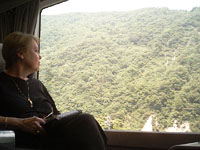



 It's good to have something tangible completed and out in the world. I spied one of the South Park gents, Trey Parker who played the Mormon protagonist in the comical Orgazmo film, coming out of Hiiragiya ryokan in Kyoto. He said he had not yet been to Tokyo this trip, so I thanked him for his excellent musical and gave him a copy of Just In Tokyo.
It's good to have something tangible completed and out in the world. I spied one of the South Park gents, Trey Parker who played the Mormon protagonist in the comical Orgazmo film, coming out of Hiiragiya ryokan in Kyoto. He said he had not yet been to Tokyo this trip, so I thanked him for his excellent musical and gave him a copy of Just In Tokyo. Jane and I share an unending torrent of topics and love language writ in email, private web pages, mobile phone mail, phone calls, hand written letters, and when we can manage, time horizontal and vertical talking talking talking and smiling smiling smiling.
Jane and I share an unending torrent of topics and love language writ in email, private web pages, mobile phone mail, phone calls, hand written letters, and when we can manage, time horizontal and vertical talking talking talking and smiling smiling smiling.